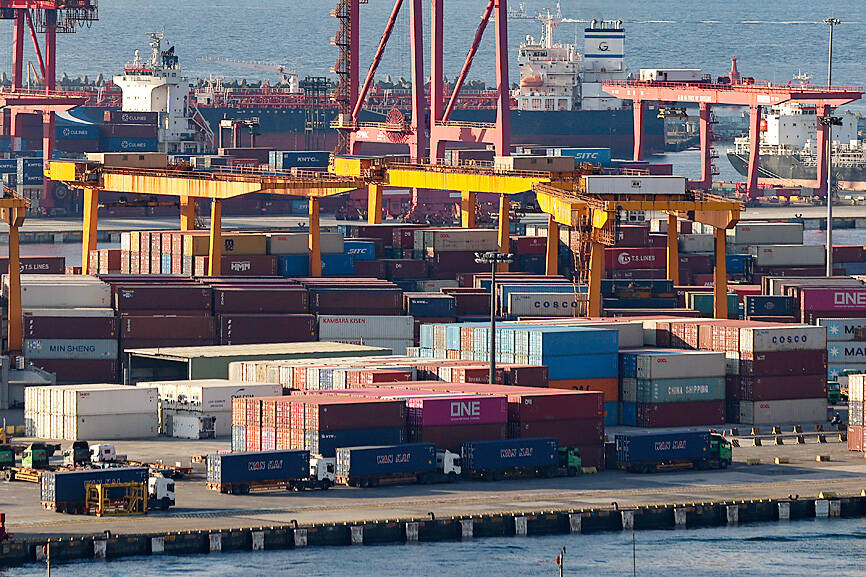Export orders last month rose 12.5 percent from a year earlier to US$53.04 billion, reaching a five-month high, while also increasing 12.1 percent to US$149.47 billion in the first quarter from a year earlier, the Ministry of Economic Affairs reported yesterday.
Last month's figure was in line with the ministry's earlier estimate of US$52 billion to US$54 billion, up 10.3 to 14.5 percent from a year earlier.
On a monthly basis, export orders last month increased 7.3 percent, which the ministry attributed to increases in orders for information and communications technology (ICT), and electronic and optoelectronic products, despite declines in orders of base metal, plastic, rubber and chemical products.

Photo: Ritchie B. Tongo, EPA-EFE
Export orders of ICT products last month rose 11.4 percent to US$14.81 billion from a year earlier, while those of electronics increased 21.8 percent to US$20.11 billion and those of optoelectronic products grew 10.4 percent to US$1.89 billion, the ministry said.
That came as continued demand from artificial intelligence (AI) and cloud computing customers in the US drove ICT orders for servers, Internet communications products and graphics processing units, while a boom in AI and high-performance computing led to a significant rise in IC orders, the ministry said.
Companies from the US placed the most orders last month, with orders growing 30.7 percent year-on-year to US$18.85 billion and accounting for 35.5 percent of total orders last month, Department of Statistics Director-General Huang Yu-ling (黃于玲) told a news conference in Taipei.
The two major growth drivers in US orders — ICT products and electronics — increased US$900.3 million and US$2.95 billion respectively from the previous month, she said.
US President Donald Trump’s tariff policy caused some US customers to front-load their orders, while some companies reported that customers were waiting for further clarity on Washington’s levies before placing orders, Huang said, citing feedback from firms.
China, including Hong Kong, placed the second-most orders last month, although the amount decreased 5.3 percent from a year earlier, accounting for 19.85 percent of the total.
Hefty US tariffs imposed on Chinese goods pose a considerable challenge for order prospects, Huang said.
“Orders from China and Hong Kong decreased, especially a US$470 million decrease in the electronics sector last month, owing to a transition period between old and new products of several IC design companies. Later developments still need close monitoring,” she added.
Europe, ASEAN members and Japan contributed 12.92 percent, 16.65 percent and 5.2 percent respectively to total orders last month, the ministry’s data showed.
The ministry forecast that export orders this month would reach between US$50 billion and US$52 billion, representing a month-on-month decline of 2 to 5.7 percent due to seasonal factors, but would be an annual increase of 6.2 to 10.4 percent.
“The annual growth rate for export orders for this month is still expected to show an upward trend,” Huang said, adding that the ministry’s forecast factored in the effects of US tariffs.
Ministry export order data included orders fulfilled through Taiwanese firms’ domestic production sites and those in overseas bases, with the latter accounting for 45.5 percent last month.

Merida Industry Co (美利達) has seen signs of recovery in the US and European markets this year, as customers are gradually depleting their inventories, the bicycle maker told shareholders yesterday. Given robust growth in new orders at its Taiwanese factory, coupled with its subsidiaries’ improving performance, Merida said it remains confident about the bicycle market’s prospects and expects steady growth in its core business this year. CAUTION ON CHINA However, the company must handle the Chinese market with great caution, as sales of road bikes there have declined significantly, affecting its revenue and profitability, Merida said in a statement, adding that it would

MARKET LEADERSHIP: Investors are flocking to Nvidia, drawn by the company’s long-term fundamntals, dominant position in the AI sector, and pricing and margin power Two years after Nvidia Corp made history by becoming the first chipmaker to achieve a US$1 trillion market capitalization, an even more remarkable milestone is within its grasp: becoming the first company to reach US$4 trillion. After the emergence of China’s DeepSeek (深度求索) sent the stock plunging earlier this year and stoked concerns that outlays on artificial intelligence (AI) infrastructure were set to slow, Nvidia shares have rallied back to a record. The company’s biggest customers remain full steam ahead on spending, much of which is flowing to its computing systems. Microsoft Corp, Meta Platforms Inc, Amazon.com Inc and Alphabet Inc are

RISING: Strong exports, and life insurance companies’ efforts to manage currency risks indicates the NT dollar would eventually pass the 29 level, an expert said The New Taiwan dollar yesterday rallied to its strongest in three years amid inflows to the nation’s stock market and broad-based weakness in the US dollar. Exporter sales of the US currency and a repatriation of funds from local asset managers also played a role, said two traders, who asked not to be identified as they were not authorized to speak publicly. State-owned banks were seen buying the greenback yesterday, but only at a moderate scale, the traders said. The local currency gained 0.77 percent, outperforming almost all of its Asian peers, to close at NT$29.165 per US dollar in Taipei trading yesterday. The

The US overtaking China as Taiwan’s top export destination could boost industrial development and wage growth, given the US is a high-income economy, an economist said yesterday. However, Taiwan still needs to diversify its export markets due to the unpredictability of US President Donald Trump’s administration, said Chiou Jiunn-rong (邱俊榮), an economics professor at National Central University. Taiwan’s exports soared to a record US$51.74 billion last month, driven by strong demand for artificial intelligence (AI) products and continued orders, with information and communication technology (ICT) and audio/video products leading all sectors. The US reclaimed its position as Taiwan’s top export market, accounting for